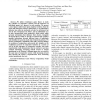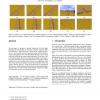978 search results - page 96 / 196 » Context-mediated behavior for intelligent agents |
IAT
2010
IEEE
13 years 8 months ago
2010
IEEE
We utilize evolutionary game theory to study the evolution of cooperative societies and the behaviors of individual agents (i.e., players) in such societies. We present a novel pla...
ATAL
2007
Springer
14 years 4 months ago
2007
Springer
Many agents are fielded within environments requiring modeling traditional organizational structures such as military hierarchies and corporations, with their associated authority...
ATAL
2006
Springer
14 years 1 months ago
2006
Springer
Intelligent agents are typically situated in a social environment and must reason about social cause and effect. Such reasoning is qualitatively different from physical causal rea...
GECCO
2009
Springer
14 years 4 months ago
2009
Springer
Embodied cognition emphasizes that intelligent behavior results from the coupled dynamics between an agent’s body, brain and environment. In response to this, several projects h...
SI3D
2009
ACM
14 years 5 months ago
2009
ACM
In this paper we propose a general framework for local pathplanning and steering that can be easily extended to perform highlevel behaviors. Our framework is based on the concept ...


